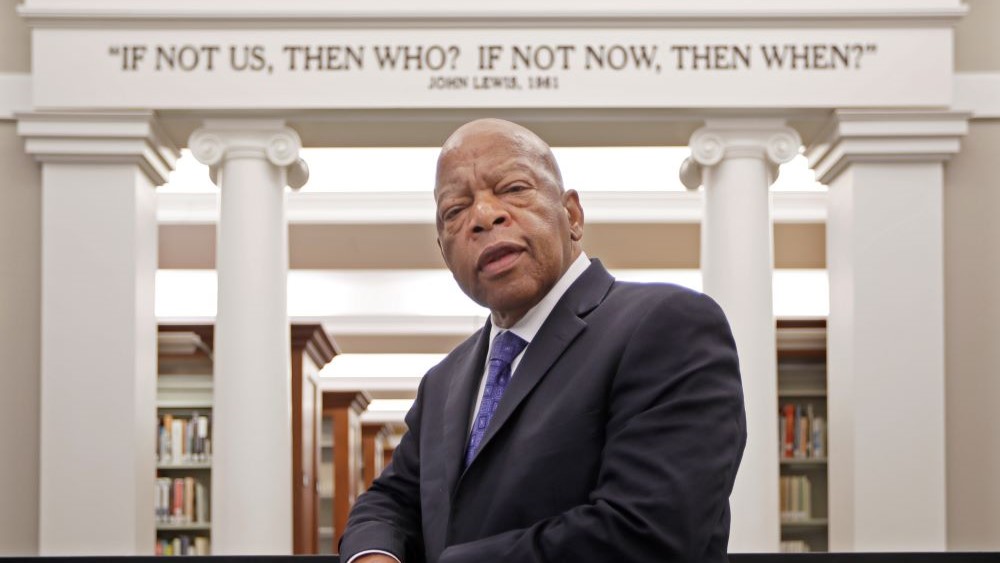
On Saturday, September 14, 2024, President Biden announced that a cohort of Fulbright U.S. Student Study/Researchers have been selected as Fulbright-John Lewis Civil Rights Fellows in remarks made during the Annual Legislative Conference of the Congressional Black Caucus Foundation.
Established through bi-partisan legislation in both the U.S. House of Representatives and the U.S. Senate, the U.S. Department of State’s Bureau of Educational and Cultural Affairs created the Fulbright-John Lewis Civil Rights Fellowship in 2024 to honor the legacy of the civil rights leader and former member of the U.S. House of Representatives John Lewis. The fellowship is designed to inspire future generations to carry on his vision of non-violent civil rights work, and promote the understanding of the history and tenets of nonviolent civil rights movements around the globe. The 2024 Fulbright-John Lewis Civil Rights Fellows represent the diversity of the United States through their backgrounds and experiences, and as researchers in a range of academic disciplines. They will carry out research projects in 23 countries in all world areas.
“I’m excited to announce tonight that we have selected the first class of Fulbright-John Lewis Civil Rights Fellows, who will learn how to establish and protect freedom and justice and equity, not just at home but around the world.” – President Biden

The Fulbright-John Lewis Fellowship provides a unique opportunity for Fulbright U.S. Student Program participants to join a cohort of their peers and participate in virtual activities advancing the goals of the Fellowship during their Fulbright exchanges such as a dedicated lecture series, leadership training, development opportunities, and an in-person capstone seminar.
The Fellows come from all regions of the United States. Their research projects explore concepts of citizenship, human rights, democratic movements, resistance to authoritarianism, and peace and conflicts studies in nations and regions across the world.
By bringing together this diverse community of researchers throughout their Fulbright experience, the Fulbright-John Lewis Civil Rights Fellowship will help these participants share knowledge with their peers, conduct meaningful research, and promote the Fulbright Program’s goal of cross-cultural exchange and mutual understanding.

2024-2025 Fulbright-John Lewis Civil Rights Fellowship Recipients
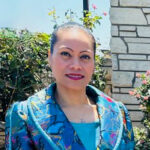
Mele’ana Kehaulani ‘Akolo
Kingdom of Tonga
Mele’ana Kehaulani ‘Akolo is a doctoral student in the Joint Doctoral Program for Interdisciplinary Research on Substance Use through San Diego State University and the University of California, San Diego. She began her higher education at Diablo Valley College, a community college in California. ‘Akolo’s Tongan background has informed her public health work as a Substance Use Disorder Counselor. In Tonga, her Fulbright-John Lewis project will focus on the disparities that women with Substance Use Disorder face regarding access to treatments. Employing a human rights framework, ‘Akolo will investigate methods, such as community-based outreach, that have the potential to reduce disparities and move toward equity in health care access.

Chamise Anderson
Barbados
Chamise Anderson is an attorney from St. Paul, Minnesota, with a law degree and a master’s in public policy from University of St. Thomas. She is a first-generation college student who began her higher education at Century College, a community college in Minnesota, and earned a bachelor’s degree from Metropolitan State University. Her genealogical and historical research focuses on the 1865 mass emigration of around 360 Barbadians, including her own ancestors, to Liberia, West Africa. Her Fulbright-John Lewis Fellowship will focus on emigration as mechanism for escape from oppressive conditions and, therefore, as a movement for civil rights.
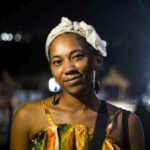
Céline Apollon
Republic of Congo
Céline Apollon is a consultant to the World Bank, supporting research and communications projects in Africa, and a senior research partner for Aspen Institute’s Women in the Economy project. Her Fulbright-John Lewis Fellowship research addresses gender-based violence by shifting the focus from prevention to healing and increasing public support for survivors. Her research in Brazzaville, Congo, will explore how to design spaces, through interviews, surveys, and community art and design sessions. that allow survivors to thrive in place.
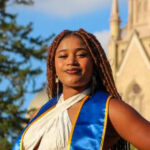
Jessica Ashman
Ecuador
Jessica Ashman is a recent graduate from the University of Notre Dame, where she majored in anthropology and global affairs. As a Black Jamaican immigrant, she has become interested in topics of Afro-descendent movements throughout the Western Hemisphere and social inclusion for marginalized populations. Her Fulbright-John Lewis Fellowship research will examine the barriers to full social inclusion for Afro-Ecuadorians and ways to mitigate them, delivering practical recommendations to the communities with whom she works.
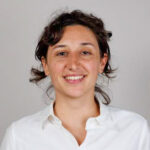
Vera Carothers
Argentina
Vera Carothers is a writer, journalist, and educator with roots in Argentina and the United States. Prior to her Fulbright, she was a senior fact-checker at The New Yorker, where she also wrote about books, documentary films, race, and culture. She earned a bachelor’s degree in literature from Brown University and a master’s degree in writing from Columbia University. On her Fulbright-John Lewis Fellowship, she is using immersive journalism to research what will become a collection of creative nonfiction essays about the performing arts as a tool of political resistance in Argentina, a tradition that goes back to the country’s founding.
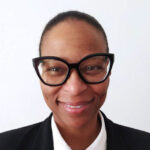
Jasmine Carty
Luxembourg
Jasmine Carty is a recent graduate of the master’s degree in counseling program at Southern Methodist University and a Licensed Professional Counselor-Associate. For her Fulbright-John Lewis research at the University of Luxembourg, she is guiding adolescents and young adults through a critical examination of their unique identity experience, resulting in a narrative expression of how the intersection of culture, migration, and public policy impacts their mental health and wellness.
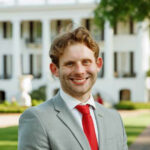
Sean Coffman Atchison
Brazil
Sean Coffman Atchison is a recent graduate of the University of Alabama, where he earned a bachelor’s degree in Latin American studies. Sean is a first-generation college student from rural Chatom, Alabama. His Fulbright-John Lewis Fellowship research aims to understand the motivations of students who become engaged in the democratic process and public service through academic curriculum or community organizing. This project will help advocates from different communities grow their engagement with young leaders.

Nilufahr Cooper
Germany
Nilufahr Cooper earned a bachelor’s degree from Barnard College with majors in history and gender studies, focusing on the South-West Asian and North African region. Her Fulbright-John Lewis Fellowship research on Germany’s Iranian Diaspora will explore the development of Berlin’s Iranian feminist collectives through oral history interviews with their members. As a first-generation Iranian-American, she hopes to shed light on how feminists reconstruct diasporic identity and community and promote transnational feminist solidarities.
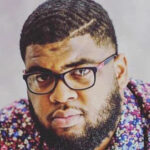
Solomon Ra’phael Davis
Nigeria
Ra’phael Davis is a PhD candidate at The Ohio State University, focusing on comparative and international politics. He has worked in public diplomacy, facilitating international exchange programs related to peacebuilding. He is a first-generation college student from Arkansas. His grandfather marched alongside John Lewis. His Fulbright-John Lewis Fellowship research focuses on how civil society organizations work with communities to build peace in the face of conflicts affecting Nigeria, especially the farmer-herder conflict. Davis seeks to exemplify a scholar-practitioner as one who both studies and helps build peace.

Victoria Dey
France
Victoria Dey earned a bachelor’s degree in French and international relations from the University of Rochester. She is a doctoral candidate in world history at Northeastern University. Her Fulbright-John Lewis Fellowship research traces the evolution of nonviolent protest movements and organizations in Black France, which saw its initial wave of mass demonstrations in the 1980s and experienced a resurgence in the 2000s. This research recognizes the pivotal role played by Black French activists in pioneering these movements while also acknowledging the transnational solidarity they fostered with their American counterparts.
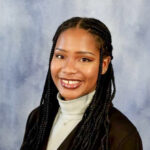
Valencia Epps
South Korea
Valencia Epps earned bachelor’s and master’s degrees in elementary education from Mississippi State University. She is a first-generation college student who started her academic journey at East Mississippi Community College. Her Fulbright-John Lewis Fellowship research aims to improve educational inequities in rural South Korea by improving collaboration between Korean natives and expats. This project addresses the gap in occupational well-being between male and female expat English teachers, ultimately contributing to systemic change in English education programs in South Korea.

Temitope Famodu
Hungary
Temitope Famodu is a PhD candidate in global and international studies at University of California-Irvine. She earned a bachelor’s degree from DePaul University. Her Fulbright-John Lewis Fellowship research will examine the educational experience of Nigerian students in post-socialist Hungary. She will investigate motivations for educational migration, intersections of identity, and historical significance in student educational exchange. Famodu will study the networks that underpin the education-migration pipeline from Nigeria to its global diasporas, and to examine the history of dialogue between Black civil rights movements in the United States and civil rights movements in Hungary.

James Flynn
South Korea
James Flynn is a doctoral candidate in history at the University of Wisconsin-Madison. His higher education began at a community college, Rowan College at Burlington County. His Fulbright-John Lewis project is a social and cultural history of community formation and literary arts movements focused on working-class men and women in a South Korean industrial port city. He aims to reshape how we understand Korean workers’ relationship to social movements and socio-cultural change by analyzing worker-produced magazines. Coming from a Korean, working-class family in the United States, he is deeply interested in the relationship between workers’ movements and democracy.

Maria Caterina Gargano
Mexico
Maria Gargano received a bachelor’s degree in psychology from the University of California, Berkeley, and a Laurea Magistrale in Protection of Human Rights and International Cooperation from Università di Bologna in Italy. A first-generation college student, she is a PhD candidate in peace studies and clinical psychology at the University of Notre Dame and the co-founder of an app to promote health during migration. Her Fulbright-John Lewis project, MARIPOSA (Migrants’ And Refugees’ Insights: Policies, Observations, Strengths & Adaptations), examines the relationship between U.S. migration policy and migrants’ mental health to identify recommended policy and practice adaptations to support wellbeing.
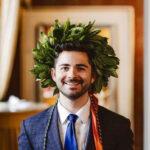
Christopher Handwerk
Kosovo
Christopher Handwerk received a bachelor’s and master’s degree in European Union policy studies from James Madison University. His focus is on democratic power-sharing in post-conflict societies that are deeply divided. His Fulbright-John Lewis Fellowship builds on his previous research at the Constitutional Court of Kosovo, exploring how proportional representation, a key element of power-sharing democracies, influences the protection of ethnic community rights. By investigating how democratic institutional designs can reduce the risk of violence, Handwerk contributes to the global conversation on conflict prevention, promoting inclusive governance to protect civil and human rights.

Nathan Johnson
United Kingdom
As a staff attorney at the New York Legal Assistance Group, Nate Johnson represented New York’s most vulnerable tenants in eviction proceedings. At Fordham Law, Nate researched abolitionist movements, comparing their goals and practices to those of the international human rights regime. On his Fulbright-John Lewis Fellowship, Nate will pursue a Master of Laws in Human Rights and Transitional Justice at Ulster University in Belfast, and conduct research into anti-carceral remedies for human rights abuses in Northern Ireland. Such remedies favor social and economic rights that bolster life outcomes without relying on punitive interventions.

Mohnish Judge
India
Mohnish Judge received a bachelor’s degree from Oregon State University in economics, with minors in religious studies and linguistics. He is interested in the intersections of language, cultural identity, and political advocacy. For his Fulbright-John Lewis project, Judge is investigating the mechanisms through which media interacts with the Tibetan diaspora communities in India. He will contribute to the current scholarship on media, diaspora studies, imperialism, and cultural preservation. Beyond his research, Mohnish will engage with the Tibetan and Indian diaspora to preserve their cultures and cultivate the values of nonviolent civil rights movements.
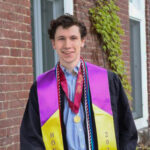
Liam Martin
Canada
Liam Martin is a recent graduate of the College of the Holy Cross, where he studied political science and sociology. He is pursuing a master’s degree in criminology and sociolegal studies at the University of Toronto. His Fulbright-John Lewis project focuses on studying the differences in Indigenous policing and criminal procedure frameworks. Currently, Canadian Indigenous communities are impacted by violent crime at rates six times higher than their non-Indigenous counterparts. As many of these crimes go unsolved, the aim of Martin’s research is to ensure that court systems’ doors remain open to civil rights concerns.
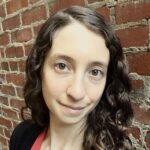
Rachel Margolis
Argentina
Rachel Margolis is a graduate of New York University School of Law and an attorney who defends tenants in eviction proceedings. She earned a bachelor’s degree from Brown University. For her Fulbright-John Lewis Fellowship she will explore legal empowerment and community lawyering in Argentina. The global legal empowerment movement aims to empower marginalized communities to understand the law, exercise their rights, and transform the legal systems that have historically excluded or oppressed them. She will study how organizations in Argentina are carrying out this work, seeking novel approaches that could be used around the world.

Francesca Nyakora
Brazil
Francesca Nyakora earned a bachelor’s degree from Yale University with a double major in political science and African studies. She received an advanced language certificate in French and a Human Rights certificate from Yale Law School. Following her graduation, she worked on research pertaining to democracy, conflict, and governance at the Carnegie Endowment for International Peace. Her Fulbright-John Lewis Fellowship research explores the impact of community organizations, including grassroots networks created by Afro-descendants, in increasing the reach of governance and service delivery in Brazil’s urban favelas. As a Kenyan-American, her commitment to racial equity inspired her to support this ongoing work.

Tesfamichael Negussie
Ethiopia
Tesfamichael Negussie is a recent graduate of Pomona College, where he double-majored in politics and art. His Fulbright-John Lewis Fellowship project focuses on creating a Speech and Debate program in Addis Ababa, Ethiopia, to develop critical thinking, public speaking, and leadership skills. As an Ethiopian immigrant to the United States, he participated in debate at international competitions, and seeks to increase African representation in debate on the global stage. Through his project, Negussie hopes to build a culture of open dialogue in Ethiopia, equipping a new generation of informed and engaged citizens who can drive positive change in their communities and beyond.
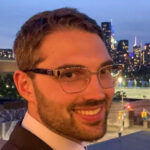
Travis Richardson
New Zealand
Travis Richardson is a PhD Candidate in sociolinguistics at Georgetown University. He uses sociolinguistic methods to better understand identity construction, inclusion, and exclusion among non-Indigenous learner-speakers of Indigenous languages. His Fulbright-John Lewis Fellowship research looks at how government support for te reo Māori, the Māori language, is changing the responsibilities and obligations of non-Māori citizens in learning and using the language in addition to English, in the belief that language rights are human rights. He hopes to explore how non-Māori New Zealanders navigate the foundational relationship of respect as established in the Treaty of Waitangi in ways that support biculturalism.

Natalie Schirmacher
Finland
Natalie Schirmacher graduated from Villanova University with a bachelor’s degree in Latin American studies and Spanish. A member of Villanova’s Naval ROTC program, she is a pursuing a master’s in peace, mediation, and conflict research at Finland’s Tampere University, exploring the intersection of military policy and international social justice movements. For her Fulbright-John Lewis project, she will research the impact of disappeared peoples in post-war reconciliation. She hopes to expand on feminist genocide research in Latin America. She is committed to a career in conflict resolution and human rights and believes systemic change must engage people from different backgrounds and perspectives.

Munirat Suleiman
Germany
Muni Suleiman is a recent graduate of Columbia University, where she majored in sociology and English. She will contribute to the field of Black feminist sociology by studying the intersection of social movements and cultural expression. For her Fulbright-John Lewis project, she will research contemporary transnational Black feminist solidarity efforts between the United States and Germany at the Free University of Berlin. As a Nigerian-American woman, who describes herself as a first-generation and low-income graduate, she believes in the importance of understanding the similarities and differences between Black womanhood across the diaspora.

Connie Ticho
South Africa
Connie Ticho earned a bachelor’s degree from Chapman University and is a recent graduate of Fordham University School of Law. In law school, their identity as gender nonconforming and queer influenced their approach to legal advocacy— one which is focused on the needs of marginalized communities. With the goal of being a civil and human rights advocate, their Fulbright-John Lewis Fellowship project focuses on the principle of Free, Prior, and Informed Consent as a solution to mining-related human rights violations, to give communities agency in their land development. Working with Lawyers for Human Rights and the Centre for Human Rights at University of Pretoria, Ticho will conduct legal research and community interviews, to help codify FPIC for use in policy and ligation proceedings.

Anthony Wagner V
Brazil
Anthony Wagner is a doctoral student in international education at New York University who has a bachelor’s degree from Gettysburg College and a master’s from the University of Pennsylvania. He is a first-generation college graduate who grew up on a small family farm in western Pennsylvania, and develops global citizens on college campuses as the associate director of the organization Transform Mid-Atlantic. For his Fulbright-John Lewis project, he will examine the perspectives and experiences of students at different types of universities regarding their political and democratic participation in Brazil, a country with a history of non-violent student movements.
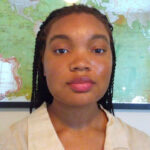
Desiree Winns
Lithuania
Desiree Winns earned a master’s in international affairs from the George Washington University. She attended the University of North Carolina School of the Arts and received a bachelor’s degree from University of Central Florida, and completed a Free Expression Fellowship at PEN America. She was born in Japan and has lived in Germany and Hong Kong, experiencing nonviolent art and democratic movements in different cultural contexts. For her Fulbright-John Lewis project, she is researching how Belarusian exiles in Lithuania use art and social media to protest Lukashenko’s regime and appeal to Western and Belarusian audiences. She intends to explore how art transcends language to resist authoritarianism in a nonviolent way.

Sophie Mariko Wheeler
Japan
Sophie Mariko Wheeler is a PhD candidate at the University of California, Irvine, focusing on modern Japanese literature and environmental humanities. She earned a bachelor’s degree from Princeton University. Wheeler grew up in a multilingual Japanese-American household where she learned to value storytelling as a way to connect to heritage. Her Fulbright-John Lewis Fellowship research looks at oral storytelling in literature and how it is important to understanding Indigeneity in Japan. The Japanese oral storytelling genre kikigaki preserves Indigenous Ainu and Okinawan stories within Indigenous rights movements in Japan and global Indigenous rights movements. Wheeler is exploring how oral literature advocates for civil rights, environmentalism, Indigenous sovereignty, and identity.
About Representative John Lewis (February 21, 1940 – July 17, 2020)
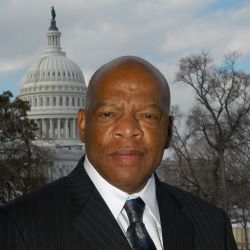
The life and career of John Lewis models the unwavering commitment to peaceful protests against injustice toward Black Americans, and the legislative victories of the U.S. civil rights movement. Born in 1940 in Alabama, Lewis was one of the student founders in 1960 of the Student Non-Violent Coordinating Committee (SNCC) and its chairman from 1963 to 1966. Lewis helped to organize many of the touchstone moments in the civil rights movement of the 1960s, including the Freedom Rides, the 1963 March on Washington, and the march from Selma to Montgomery, Alabama.
In 1963, Lewis addressed the crowd at the March on Washington before Martin Luther King, Jr.’s “I Have a Dream Speech” and met with President Kennedy. He faced threats, arrest, and endured violence, most famously during the “Bloody Sunday” march in 1965 on the Edmund Pettus Bridge, which spurred the passage of the Voting Rights Act in the same year. During the late 1960s through the 1980s, Lewis devoted his time to various community organizing and voter registration efforts.
In 1987, Lewis was elected to represent Georgia’s 5th District in the House of Representatives, where he served until 2020 as the “conscience of the Congress,” passing legislation such as the 2003 bill establishing the National Museum of African American History and Culture, which stands on the National Mall in Washington, D.C.
Adapted from The National Archives and Smithsonian Magazine